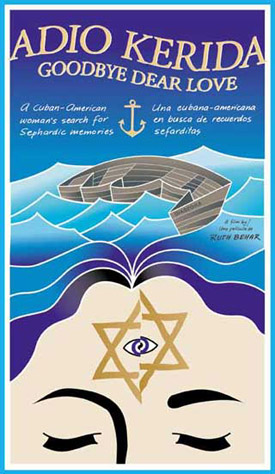- Adio Kerida
Infobox Film
name = Adio Kerida: Goodbye my Dear Love

image_size = 150px
caption =
director =Ruth Behar
producer =
writer =
narrator =
starring =
music =
cinematography =
editing =
distributor =
released =2002 (USA)
runtime = 82 min.
country =
language = Spanishwith English subtitles
budget =
preceded_by =
followed_by =
website = http://www.wmm.lfchosting.com/filmcatalog/pages/c598.shtml
amg_id =
imdb_id =http://www.imdb.com/title/tt0355174/"Adio Kerida: Goodbye my Dear Love" is an award-winning
2002 documentary byanthropologist Ruth Behar that follows her trip back toCuba , the place of her childhood, as she searches for memories from her past and investigates the dwindling Jewish community that remains.ummary
Ruth Behar was Born in Cuba before
Castro ’srevolution but was too young to remember theHavana that she and her family left behind upon immigrating to theU.S. The film follows as Behar leaves her home inMichigan to return to Havana, where her father and grandfather once worked aspeddlers .Behar presents Danayda Levy as an example of
Cuban Jewry . Danayda’s mother is a Jehovah’s Witness, while her father, Jose, is president of the Sephardi Jewish center. She sits in her mother’s apartment, with her sister who practicesSanteria , the Nigerian-cum-Afro-Cuban religion. While Santeria sings praise toElegua , the “one who opens doors,” Danayda plays the drum and professes her commitment toJudaism . Danayda reads from theTorah with her father's help.Ruth Behar is half
Ashkenazi and halfSephardic . Her father, a dark haired Turkish Jew, traces his history back to the expulsion of the Jews from Spain in 1492. “It is said that when our ancestors left Spain, they took the keys with them,” says Behar, “always believing in the possibility of return.” Fittingly then, she finds reminders of her family’s history everywhere: her parents’ former apartment in Havana is unaltered –- not a piece of furniture out of place; the Behar name is all over the gravestones in the Sephardic cemetery; and on the street named Inquisador, Behar visits the ruins of her father’s temple. She asks, “Who am I in Cuba? A returningnative , a reluctantanthropologist , or atourist ?”Reception
"Visual Anthropology Review":"Personal, poetic, and reflective...offers a glimpse into a relatively unknown realm of the Cuban reality. Recommended."
"Library Journal":"Offers an easy-to-view introduction to a fascinating culture. Libraries with strong Jewish studies collections should definitely have this one."
References
*cite news
last =
first =
title =Adio Kerida
language = English
publisher = The Jewish Channel
date =
url =http://www.tjctv.com/movies/adio-kerida/
accessdate = July 28**cite news
last =
first =
title =Adio Kerida (Goodbye Dear Love)
language = English
publisher = Women Making Movies
date =
url =http://www.wmm.lfchosting.com/filmcatalog/pages/c598.shtml
accessdate = July 28ee also
*
Culture of Cuba
*History of the Jews in Latin America
*List of Latin American Jews
*History of the Jews in Cuba Other films about Cuban Jewry:
*""
*""
*"Trip to Jewish Cuba "External links
* [http://www.wmm.lfchosting.com/filmcatalog/pages/c598.shtml "Women Making Movies" review]
* [http://www.ruthbehar.com/AdioKerida.htm Ruth Behar's website]
* [http://movies.nytimes.com/movie/306741/Adio-Kerida/overview "New York Times" write-up]
* [http://www.imdb.com/title/tt0355174/ IMDb page]
Wikimedia Foundation. 2010.
